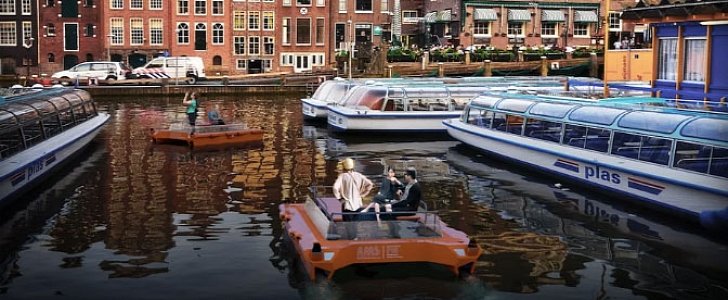When half the traffic that goes on in the city is done by water, and the other half on bicycles, you tend not to be too interested in all this talk of autonomous technology unless they can apply it to either bikes or boats.
Wait a minute: self-driving boats? How come nobody thought about this sooner? Well, there are probably a number of reasons each and every one of them making perfect sense, but there is now a five-year research plan that aims to put artificial intelligence in the countless canals of the Dutch capital city.
The Amsterdam Institute for Metropolitan Solutions (AMS in short) has joined hands with the Massachusetts Institute of Technology (better known as MIT) and two Dutch universities (the Delft University of Technology and Wageningen University and Research) to investigate the possibility of using self-driving know-how to create an armada of robotic boats. Called "Roboat," it is the first project of this nature and scale.
“Imagine a fleet of autonomous boats for the transportation of goods and people,” says Carlo Ratti, Professor at MIT and principal investigator in the Roboat-program, “but also think of dynamic and temporary floating infrastructure like on-demand bridges and stages, that can be assembled or disassembled in a matter of hours.” It sounds a little far-fetched, but when you look at the modular design of these Roboats, it immediately starts to make sense.
The researchers plan to do much more with these boats than simply ferry people around. “Roboat offers enormous possibilities,” says Professor Arjan van Timmeren, AMS Institute’s Scientific Director, “as we’ll also be exploring environmental sensing. We could for instance do further research on underwater robots that can detect diseases at an early stage or use Roboats to rid the canals from floating waste and find a more efficient way to handle the 12,000 bicycles that end up in the city’s canals each year.”
The first Roboat prototypes are expected to figuratively hit the Amsterdam canals sometime during the course of next year, with more to follow. The program benefits from a $20 million contribution from MIT and would like to make Amsterdam its pilot location, with others to follow afterward depending on its success.
The Amsterdam Institute for Metropolitan Solutions (AMS in short) has joined hands with the Massachusetts Institute of Technology (better known as MIT) and two Dutch universities (the Delft University of Technology and Wageningen University and Research) to investigate the possibility of using self-driving know-how to create an armada of robotic boats. Called "Roboat," it is the first project of this nature and scale.
“Imagine a fleet of autonomous boats for the transportation of goods and people,” says Carlo Ratti, Professor at MIT and principal investigator in the Roboat-program, “but also think of dynamic and temporary floating infrastructure like on-demand bridges and stages, that can be assembled or disassembled in a matter of hours.” It sounds a little far-fetched, but when you look at the modular design of these Roboats, it immediately starts to make sense.
The researchers plan to do much more with these boats than simply ferry people around. “Roboat offers enormous possibilities,” says Professor Arjan van Timmeren, AMS Institute’s Scientific Director, “as we’ll also be exploring environmental sensing. We could for instance do further research on underwater robots that can detect diseases at an early stage or use Roboats to rid the canals from floating waste and find a more efficient way to handle the 12,000 bicycles that end up in the city’s canals each year.”
The first Roboat prototypes are expected to figuratively hit the Amsterdam canals sometime during the course of next year, with more to follow. The program benefits from a $20 million contribution from MIT and would like to make Amsterdam its pilot location, with others to follow afterward depending on its success.




